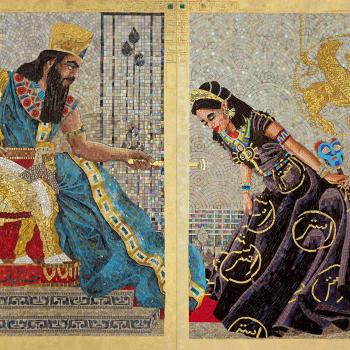By Shai Ginsburg
 Raphaël Nadjari's film, A History of Israeli Cinema, is in fact, groundbreaking. It is the first attempt ever to survey the history of Israeli cinema in the same medium, that is, in film. The outcome is captivating. The documentary will serve as an excellent introduction to those unfamiliar with Israeli film and will certainly become the bread and butter of all college classes on the subject. It is also simply fascinating.
Raphaël Nadjari's film, A History of Israeli Cinema, is in fact, groundbreaking. It is the first attempt ever to survey the history of Israeli cinema in the same medium, that is, in film. The outcome is captivating. The documentary will serve as an excellent introduction to those unfamiliar with Israeli film and will certainly become the bread and butter of all college classes on the subject. It is also simply fascinating.
Nadjari does not introduce a new history of Israeli cinema. Rather, he portrays it the way it has been described and taught over the past two decades. He thus divides his film into two parts. The first, which focuses on the years 1933-1978, presents a rather homogeneous film scene, shaped and formed by a single idea at a time. At the center of stage is Zionist ideology, the establishment of a new state, and of a new Jewish society and culture. Israeli movies moved from portraying the glory of the Zionist endeavor in Palestine and, in particular, of the New Hebrew Man, through a paean to Jewish might, to ethnic comedies (the Bourekas films) that brought to the surface inter-Jewish ethnic tensions, and finally to personal cinema that explored the confusion of the hegemonic Ashkenazi middle class in general, and of the Ashkenazi male in particular.
The first part of Nadjari's survey is easier to follow than the second part, which deals with the period falling between 1978-2005, and which presents a much more convoluted film scene that pulls in divergent directions. During this era's first decade, the homogeneity that characterized Israeli filmmaking is still somewhat present, at least in terms of subject matter. However, this work is by no means quiescent. The late 1970s through the 1980s were dominated by films that, for the first time, turned on the Israeli-Palestinian conflict, with the fate of Palestinians under Israeli authority of paramount concern. Yet, the early 1990s saw the emergence of new films that are much harder to group together under any specific rubric. Israeli cinema no longer followed a single theme or style, but multiple ones.
 The sense of disorder is also enhanced by the way Nadjari introduces selections from different Israeli movies. One of the most successful decisions of the director was not to make do with short clips from as many films as possible but, rather, to present longer sequences selected from fewer films to allow viewers to get a deeper sense of these productions. Yet, whereas in the first part, each sequence is properly introduced and contextualized, and its relationship to the present stage of Israeli cinema is made clear, the sequences in the second part lack such context. This is another indication of the disappearance of the homogeneous frame of reference that shaped Israeli cinema for the first few decades of its history.
The sense of disorder is also enhanced by the way Nadjari introduces selections from different Israeli movies. One of the most successful decisions of the director was not to make do with short clips from as many films as possible but, rather, to present longer sequences selected from fewer films to allow viewers to get a deeper sense of these productions. Yet, whereas in the first part, each sequence is properly introduced and contextualized, and its relationship to the present stage of Israeli cinema is made clear, the sequences in the second part lack such context. This is another indication of the disappearance of the homogeneous frame of reference that shaped Israeli cinema for the first few decades of its history.
Nadjari's second formative decision was to cut between film sequences and interview sequences. These include interviews with directors, actors, producers, film scholars, and critics. The director does not see his interviewees as subservient to the film sequences. On the contrary, he turns them into subjects in their own right, of equal importance to the films that they discuss and analyze. A History of Israeli Cinema thus does not merely accentuate the central role scholars and critics played in shaping and forming Israeli films. After all, many filmmakers make their living teaching in the different departments of cinema studies and communication alongside many of the film critics and scholars. History is as much about the relationship between his interviewees and Israeli films as it is about the history of Israeli cinema. The director thus opens his film with the 1935 Avodah (Labor), which fetishizes the figure of the Jewish-Zionist settler in Palestine, and cuts to the figure of Nachman Ingber, one of Israel's most influential film critics, who ironically looks much more like the "Old Jew" Zionism tried to overcome than the young, muscular, and Aryan looking man that it set as a masculine ideal.
 That said, Nadjari's film primarily focuses on the history of feature filmmaking in Israel. The one documentary he discusses, David Perlov's Yoman (Diary, 1973-1983), accentuates the absence of other documentaries, and begs the question about what the relationship is between documentary and feature filmmaking in general and the boom in both that we have witnessed over the past decade in Israel.
That said, Nadjari's film primarily focuses on the history of feature filmmaking in Israel. The one documentary he discusses, David Perlov's Yoman (Diary, 1973-1983), accentuates the absence of other documentaries, and begs the question about what the relationship is between documentary and feature filmmaking in general and the boom in both that we have witnessed over the past decade in Israel.




